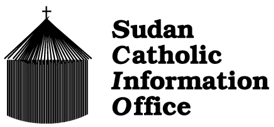Church grows against many odds
On the occasion of the reception of His Lordship the Bishop of Diocese of Rumbek, Caesar Mazzolari, in Gogrial County, the local Christian community took the chance to express their gratitudes and update him on the progress the church had made in the face of numerous bottlenecks. Their speech is re-printed below:
We, the Christian communities in this county, have a great pleasure to congratulate you and members of your delegation for the accomplishment of your missionary journey to our land. We welcome you particularly to the Liet-Nhom of Toich Payam.
Your decision to visit us is highly appreciated as it is of great significance to our Christian life.
First, no religious leader of your calibre has visited this part of our county since the first baptism of our elders in 1910. It is a glorious renewal of our lives received from Your Lordship.
We welcome and thank you and members of your delegation for coming to share with us in the numerous hardships that we face. The visit, coming at a time of the year when there are mosquitoes, heavy rains and other envrionmental hazards, demonstrates your commitment to nourishing your people both materially and spiritually.
Secondly, the missionary journey is an accomplishment of our Lord's desire to save lives of people still in darkness. The visit also confirms the sustainability of rehabilitation of souls and promotion of faith in the land.
Your Lordship, may we assure you that even though our lives have been threatened by the government-sponsored militias, we have never forget our Lord's saying that he gave up his life for us. In the light of this Your Lordship, we have undertaken the following in different parts of our county;
a) Pathuou Payam
Nine chapels have been constructed at Yiik-Adoor, Angeerngeer, Madiang Biong, Makuer, Mayom, Luonyaker, Mawut Anaiyer, Mayen Rual and Wun Abiei. Only two catechists serving at Yiik are trained..
b) Toich Payam
Eight chapels have been constructed at Liet-Nhom, Pan Acier, Ajogo, Thiek Thou, Ruot Tur and Tarweng. Untrained catechists serve all of them.
c) Kuajok Payam
Three chapels have been constructed at Ajiep, Weel and Mayang. These too are served by untrained personnel. The total manpower comprises 32 trained and untrained catechists. Those working with the Catholic Relief Service in the county are 13.
In the light of these Your Lordship, the churches in this county are requesting for services such as education , health, church library and humanitarian relief.
We remain Your Lordship with happiness you brought us in form of spiritual strength and soul enrichment.
Joseph Jok Manyok
Secretary, Catholic Relief Services
On behalf of Christian community
Diocese of Rumbek.
----------------------------------------------------------------------
SUDAN CATHOLIC INFORMATION OFFICE
Bethany House, P. O. Box 21202, Nairobi, Kenya
tel. +254.2.577595 or 577949, fax 577327
e-mail: [email protected]
----------------------------------------------------------------------
For further information, please contact:
Fr. Kizito, SCIO, tel +254.2.577595 - fax +254.2.577327 - e-mail: 
